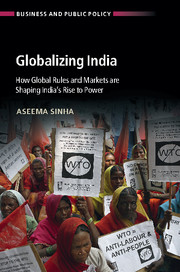Book contents
- Frontmatter
- Dedication
- Contents
- List of figures
- List of tables
- Preface and acknowledgments
- Note on currency translation
- List of abbreviations
- 1 How global rules and markets are shaping India's rise to power
- 2 A theory of causal mechanisms and Global Design-in-Motion
- 3 Trade, statecraft, and state capacity in India
- 4 Realigning interests toward global reach: Changes in India's pharmaceutical sector
- 5 Mobilizing new interests and tying the state's hands: Decline and revival in the textile sector
- 6 Interests in motion: Private sector change in India's textile sector
- 7 Mechanisms of change within global markets
- 8 Conclusion
- Appendix: Field trips, and list of interviews, and libraries visited
- References
- Index
Preface and acknowledgments
Published online by Cambridge University Press: 05 April 2016
- Frontmatter
- Dedication
- Contents
- List of figures
- List of tables
- Preface and acknowledgments
- Note on currency translation
- List of abbreviations
- 1 How global rules and markets are shaping India's rise to power
- 2 A theory of causal mechanisms and Global Design-in-Motion
- 3 Trade, statecraft, and state capacity in India
- 4 Realigning interests toward global reach: Changes in India's pharmaceutical sector
- 5 Mobilizing new interests and tying the state's hands: Decline and revival in the textile sector
- 6 Interests in motion: Private sector change in India's textile sector
- 7 Mechanisms of change within global markets
- 8 Conclusion
- Appendix: Field trips, and list of interviews, and libraries visited
- References
- Index
Summary
This book charts the emergence of India onto the international economic stage. In the 1990s, Indian policymakers, politicians, and private sector actors were wary of opening their borders to trade flows. By 2016, trade constituted almost half of India's GDP, and India had become an integral part of the world order. Today, Indian policymakers negotiate strongly at the global level, and Indian companies have moved into new markets and formed global alliances. Yet, India's economic rise at the global level was not inevitable. The process by which India is transforming is the focus of this book. I explore the economic rise of India through the actions of domestic state and private actors, who have changed what they want and how they mobilize in a very short span of time. Underlying this global emergence is a quieter revolution represented by changing trade capacities and private sector reform and transformation. The transformations described in this book have spread across larger arenas of the Indian economy, resulting in Indian consent and appetite for globalization. Scholars have to document this changed reality even if they are ambivalent about the effects of India's ongoing reform trajectory, as I am.
Was the rise of India made possible by changing economic conditions and global opportunities? Did globalization represent a new set of market incentives and price signals? While market opportunities have played a role, this transformation is also authored by the trading state, which pursues a strategy of global engagement in very different ways from the dirigiste state (1960s) or the reforming state (1991). The Indian state, now, pursues, tradecraft, introducing new trade policies, negotiating in trade forums in more capable ways, creating new interests, and partnering with globally oriented Indian firms. This transformation has also shifted domestic trade politics, creating export-oriented firms and sectors within India's political economy. New interests favoring global engagement were created within India's public and private sectors. Woodwork reformers sought to create spaces for trade reform within a sticky domestic political economy. New perception of opportunities presented by globalization led to a realignment of interests among globalization's opponents. Sectors and groups that lost as a result of these developments found it more difficult to mobilize against globalization, as the balance of power shifted toward a more globally open trade agenda.
- Type
- Chapter
- Information
- Globalizing IndiaHow Global Rules and Markets are Shaping India's Rise to Power, pp. xi - xvPublisher: Cambridge University PressPrint publication year: 2016

